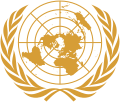The Special Committee on Peacekeeping Operations of the United Nations, or C34, is a committee of the United Nations General Assembly. It focuses issues relating to peacekeeping.[1]
 | |
| Abbreviation | C34 |
|---|---|
| Formation | 18 February 1965 |
| Legal status | Active |
| Headquarters | New York, United States |
Head | Chair |
Parent organization | United Nations General Assembly |

History
editThe Special Committee was created on 18 February 1965 by Resolution 2006 (XIX).[2] It was mandated to conduct a comprehensive review of all issues relating to United Nations peacekeeping.
Each year the General Assembly extends in mandate and calls for it to consider any new proposals that work to enhance the capacity of the United Nations to fulfil its responsibilities in the field of peacekeeping.[3][4]
Working methods
editThe Committee typically holds a substantive session in New York beginning in February and ending in March. At this session, it reviews progress on its previous proposals, as well as considers new efforts to increase the capacity of the United Nations' peacekeeping operations. At the end of the session, the Committee provides policy recommendations through its Report of the Special Committee on Peacekeeping Operations.[5]
The Committee reports to the General Assembly on its work through the Fourth Committee (Special Political and Decolonization).[6][7]
Membership
editThe membership of the Committee is split between full members and observers. The full members are mostly past or current contributors to peacekeeping operations.[7][5]
Full members
edit- Afghanistan
- Albania
- Algeria
- Angola
- Argentina
- Armenia
- Australia
- Austria
- Azerbaijan
- Bangladesh
- Belarus
- Belgium
- Benin
- Bhutan
- Bolivia (Plurinational State of)
- Bosnia and Herzegovina
- Brazil
- Brunei Darussalam
- Bulgaria
- Burkina Faso
- Burundi
- Cambodia
- Cameroon
- Canada
- Central African Republic
- Chad
- Chile
- China
- Colombia
- Congo
- Costa Rica
- Côte D’Ivoire
- Croatia
- Cuba
- Cyprus
- Czech Republic
- DR Congo
- Denmark
- Djibouti
- Dominican Republic
- Ecuador
- Egypt
- El Salvador
- Eritrea
- Estonia
- Eswatini
- Ethiopia
- Fiji
- Finland
- France
- Gabon
- Gambia (Republic of The)
- Georgia
- Germany
- Ghana
- Greece
- Grenada
- Guatemala
- Guinea
- Guyana
- Haiti
- Honduras
- Hungary
- Iceland
- India
- Indonesia
- Iran (Islamic Republic of)
- Iraq
- Ireland
- Israel
- Italy
- Jamaica
- Japan
- Jordan
- Kazakhstan
- Kenya
- Kuwait
- Kyrgyzstan
- Lao People’s Democratic Republic
- Latvia
- Lebanon
- Lesotho
- Liberia
- Libya
- Lithuania
- Luxembourg
- Madagascar
- Malawi
- Malaysia
- Mali
- Mauritania
- Mauritius
- Mexico
- Mongolia
- Montenegro
- Morocco
- Mozambique
- Myanmar
- Namibia
- Nepal
- Netherlands
- New Zealand
- Nicaragua
- Niger
- Nigeria
- North Macedonia
- Norway
- Pakistan
- Palau
- Papua New Guinea
- Paraguay
- Peru
- Philippines
- Poland
- Portugal
- Qatar
- Republic of Korea
- Republic of Moldova
- Romania
- Russian Federation
- Rwanda
- Samoa
- Saudi Arabia
- Senegal
- Serbia
- Sierra Leone
- Singapore
- Slovakia
- Slovenia
- South Africa
- Spain
- Sri Lanka
- Sudan
- Sweden
- Switzerland
- Syrian Arab Republic
- Thailand
- East Timor
- Togo
- Tunisia
- Turkey
- Uganda
- Ukraine
- United Kingdom of Great Britain and Northern Ireland
- United Republic of Tanzania
- United States of America
- Uruguay
- Vanuatu
- Venezuela, Bolivarian Republic of
- Viet Nam
- Yemen
- Zambia
- Zimbabwe
Observers
edit- African Union
- Botswana
- Equatorial Guinea
- European Union
- Holy See
- United Arab Emirates
- International Committee of the Red Cross
- International Criminal Court
- International Criminal Police Organization
- International Institute for Democracy and Electoral Assistance
- Organisation of Islamic Cooperation
- Organisation internationale de la Francophonie
- Sovereign Military Order of Malta
Bureau
editThe following make up the bureau of the Special Committee for the 73rd Session of the General Assembly:[7]
| Name | Country | Position |
|---|---|---|
| Tijjani Muhammad Bande | Nigeria | Chair |
| Gabriela Martinic | Argentina | Vice-Chair |
| Michael Grant | Canada | Vice-Chair |
| Takeshi Akahori | Japan | Vice-Chair |
| Mariusz Lewicki | Poland | Vice-Chair |
| Mohammad Aboulwafa | Egypt | Rapporteur |
References
edit- ^ "Special Committee on Peace-Keeping Operations (C34)". Peace Women. Women's International League of Peace and Freedom. n.d. Retrieved 9 March 2019.
- ^ United Nations General Assembly Session 19 Resolution 2006 (XIX). Comprehensive Review of the Whole Question of Peace-Keeping Operations in All Their Aspects A/RES/2006(XIX) 18 February 1965. Retrieved 9 March 2019.
- ^ United Nations General Assembly Session 70 Resolution 268. Comprehensive review of the whole question of peacekeeping operations in all their aspects A/RES/70/268 14 June 2016. Retrieved 9 March 2019.
- ^ United Nations General Assembly Session 71 Resolution 314. Comprehensive review of the whole question of peacekeeping operations in all their aspects A/RES/71/314 19 July 2017. Retrieved 9 March 2019.
- ^ a b United Nations General Assembly Session 72 Supplement 19. Report of the Special Committee on Peacekeeping Operations A/72/19 15 March 2018. Retrieved 9 March 2019.
- ^ "General Assembly and Peacekeeping". United Nations. United Nations. n.d. Archived from the original (PDF) on 9 October 2017. Retrieved 9 March 2019.
- ^ a b c Manhire, Vanessa, ed. (2018). "United Nations Handbook 2018-19" (PDF). United Nations Handbook:: An Annual Guide for Those Working within the United Nations (56th ed.). Wellington: Ministry of Foreign Affairs and Trade of New Zealand: 60–62. ISSN 0110-1951.
External links
edit